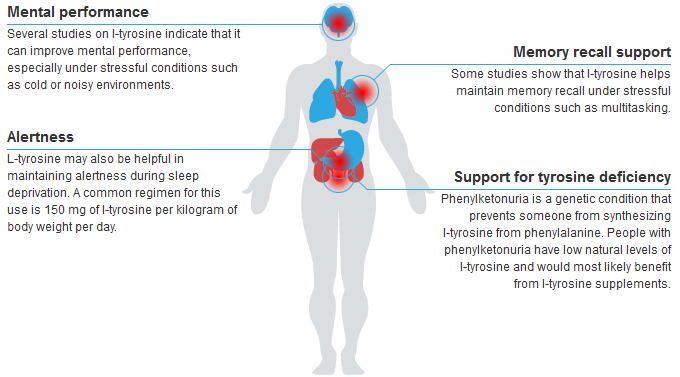L-tyrosine is a non-essential amino acid that supports cognitive functions like mental performance, alertness, and memory under stressful conditions, while also addressing deficiencies caused by conditions like phenylketonuria that impair tyrosine synthesis, thereby benefiting overall health and well-being.
L-tyrosine is an amino acid known chemically as 4-hydroxyphenylalanine. It is one of the 22 amino acids that the human body uses to build proteins. L-tyrosine is classified as a non-essential amino acid, meaning that it can be synthesized from other amino acids. The German chemist Justus von Liebig isolated L-tyrosine in 1846 from the protein casein in cheese. The word "tyrosine" comes from the Greek word “tyros,” which means cheese.
The primary role of L-tyrosine is its part in protein synthesis. Its functions include signal transduction in proteins and the reception of phosphate groups from protein kinases, which are enzymes that modify proteins.
L-tyrosine is typically synthesized from phenylalanine, which is available from many dietary sources. The most significant sources of phenylalanine are generally high-protein foods such as meat or fish. Dairy products such as milk, cheese and yogurt also contain high levels of phenylalanine. Additional foods that contain phenylalanine include avocados, bananas and lima beans.
Common reasons for taking l-tyrosine include low natural levels of this amino acid as well as specific conditions caused by a tyrosine deficiency.
Tyrosine deficiency is the most common reason for taking tyrosine supplements. People also take this amino acid for mental fatigue and stress.
Several studies on l-tyrosine indicate that it can improve mental performance, especially under stressful conditions such as cold or noisy environments.
L-tyrosine may also be helpful in maintaining alertness during sleep deprivation. A common regimen for this use is 150 mg of l-tyrosine per kilogram of body weight per day.
Some studies show that l-tyrosine helps maintain memory recall under stressful conditions such as multitasking.
Phenylketonuria is a genetic condition that prevents someone from synthesizing l-tyrosine from phenylalanine. People with phenylketonuria have low natural levels of l-tyrosine and would most likely benefit from l-tyrosine supplements.

The most common signs of l-tyrosine deficiency includes flu-like symptoms such as fatigue, swollen joints, aching muscles and pale skin. A lack of interest in recreational activities is also an indication that you may benefit from l-tyrosine supplements.
Additional signs of a tyrosine deficiency are low levels of thyroid hormone, which requires l-tyrosine. These signs include weight gain and water retention in the absence of any changes in activity level or diet.
l-tyrosine, l tyrosine, tyrosine
Shipping calculated at checkout
